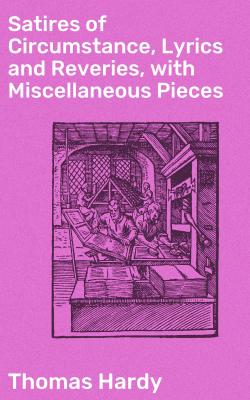Satires of Circumstance, Lyrics and Reveries, with Miscellaneous Pieces. Томас Харди
Читать онлайн.| Название | Satires of Circumstance, Lyrics and Reveries, with Miscellaneous Pieces |
|---|---|
| Автор произведения | Томас Харди |
| Жанр | Языкознание |
| Серия | |
| Издательство | Языкознание |
| Год выпуска | 0 |
| isbn | 4057664639028 |
My spirit will not haunt the mound
Above my breast,
But travel, memory-possessed,
To where my tremulous being found
Life largest, best.
My phantom-footed shape will go
When nightfall grays
Hither and thither along the ways
I and another used to know
In backward days.
And there you’ll find me, if a jot
You still should care
For me, and for my curious air;
If otherwise, then I shall not,
For you, be there.
WESSEX HEIGHTS (1896)
There are some heights in Wessex, shaped as if by a kindly hand
For thinking, dreaming, dying on, and at crises when I stand,
Say, on Ingpen Beacon eastward, or on Wylls-Neck westwardly,
I seem where I was before my birth, and after death may be.
In the lowlands I have no comrade, not even the lone man’s friend—
Her who suffereth long and is kind; accepts what he is too weak to mend:
Down there they are dubious and askance; there nobody thinks as I,
But mind-chains do not clank where one’s next neighbour is the sky.
In the towns I am tracked by phantoms having weird detective ways—
Shadows of beings who fellowed with myself of earlier days:
They hang about at places, and they say harsh heavy things—
Men with a frigid sneer, and women with tart disparagings.
Down there I seem to be false to myself, my simple self that was,
And is not now, and I see him watching, wondering what crass cause
Can have merged him into such a strange continuator as this,
Who yet has something in common with himself, my chrysalis.
I cannot go to the great grey Plain; there’s a figure against the moon,
Nobody sees it but I, and it makes my breast beat out of tune;
I cannot go to the tall-spired town, being barred by the forms now passed
For everybody but me, in whose long vision they stand there fast.
There’s a ghost at Yell’ham Bottom chiding loud at the fall of the night,
There’s a ghost in Froom-side Vale, thin lipped and vague, in a shroud of white,
There is one in the railway-train whenever I do not want it near,
I see its profile against the pane, saying what I would not hear.
As for one rare fair woman, I am now but a thought of hers,
I enter her mind and another thought succeeds me that she prefers;
Yet my love for her in its fulness she herself even did not know;
Well, time cures hearts of tenderness, and now I can let her go.
So I am found on Ingpen Beacon, or on Wylls-Neck to the west,
Or else on homely Bulbarrow, or little Pilsdon Crest,
Where men have never cared to haunt, nor women have walked with me,
And ghosts then keep their distance; and I know some liberty.
IN DEATH DIVIDED
I
I shall rot here, with those whom in their day
You never knew,
And alien ones who, ere they chilled to clay,
Met not my view,
Will in your distant grave-place ever neighbour you.
II
No shade of pinnacle or tree or tower,
While earth endures,
Will fall on my mound and within the hour
Steal on to yours;
One robin never haunt our two green covertures.
III
Some organ may resound on Sunday noons
By where you lie,
Some other thrill the panes with other tunes
Where moulder I;
No selfsame chords compose our common lullaby.
IV
The simply-cut memorial at my head
Perhaps may take
A Gothic form, and that above your bed
Be Greek in make;
No linking symbol show thereon for our tale’s sake.
V
And in the monotonous moils of strained, hard-run
Humanity,
The eternal tie which binds us twain in one
No eye will see
Stretching across the miles that sever you from me.
THE PLACE ON THE MAP
I
I look upon the map that hangs by me—
Its shires and towns and rivers lined in varnished artistry—
And I mark a jutting height
Coloured purple, with a margin of blue sea.
II
—’Twas a day of latter summer, hot and dry;
Ay, even the waves seemed drying as we walked on, she and I,
By this spot where, calmly quite,
She informed me what would happen by and by.
III
This hanging map depicts the coast and place,
And resuscitates therewith our unexpected troublous case
All distinctly to my sight,
And her tension, and the aspect of her face.
IV
Weeks and weeks we had loved beneath that blazing blue,
Which had lost the art of raining, as her eyes to-day had too,
While she told what, as by sleight,
Shot our firmament with rays of ruddy hue.
V
For the wonder and the wormwood of the whole
Was that what in realms of reason would have joyed our double soul
Wore a torrid tragic light
Under order-keeping’s rigorous control.
VI
So, the map revives her words, the spot,
